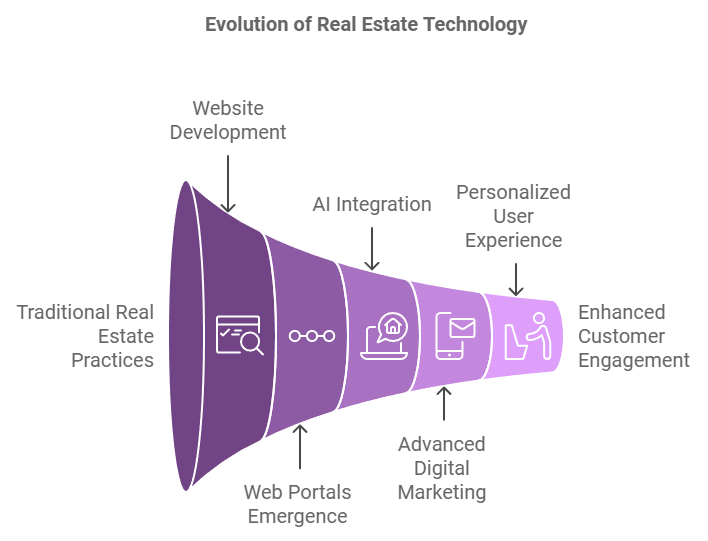Technology in the real estate industry has evolved over time to integrate Augmented Reality, IoT, and even ML to a great extent. With proptech solutions for real estate, the industry has seen a shift from traditional marketing to advanced digital marketing strategies. Being a high-value business, real estate companies are not shy to integrate technologies if it provides value to their customers and the company.

Current Landscape of Real Estate Tech
The ’90s saw websites, while the 2000s saw web portals for real estate businesses which were booming. In 2024, websites are moving towards web applications which deliver solutions and are targeted towards the requirements of the audience. Custom-tailored real estate engagement tools, AI- and ML-powered chatbots to recommend tools are evolving rapidly. Today, in 2024, companies are focused on real estate app personalization to deliver solutions tailored to the audience.
Property Listing and Details
Traditional property listings and details do exist on most websites. Websites targeted at property listing app development are still trending and widely used. The property management software has not yet evolved to personalize listings to customer needs. CRM software is still traditional in most cases. This is about to change rapidly with AI. Real estate CRM integration with AI on web applications will see changes in the way customers interact with real estate companies. More and more companies, big and small, will harness the power of AI to understand the sentiments of customers and provide real estate listings according to their personal needs. While search features are available, they will be personalized too. With information on the customer’s history, social media profile details, and more, AI will be able to tailor real estate property listings to the user’s preference.
Efficient Search and Filters
Real estate websites have improved and advanced search features, including search bars with autocomplete options. In 2024, real estate websites are already showing potential matches for property types and locations based on real-time suggestions. Intelligent search features coupled with AI or machine learning have evolved to predict user searches based on past user behavior and common searches they have done previously. Advanced filtering options have their place in real estate web apps, with property type filters, location filters, price range, amenity filters, size filters, and property features. It’s now easy to find a property with hardwood floors, walk-in closets, fireplaces, and a combination of all of them. Search features are also advanced with multi-criteria search enabling people to find a combination of search filters. For instance, “3 Bedroom Apartment” with “Fireplace and Swimming Pool” below the budget of $300,000.
Interactive Maps and Virtual Tours
While location-based text search is valuable, interactive map-based search takes it a step further. Interactive maps incorporate dynamic maps where users can search for properties visually. The map highlights property listings based on the user’s search filters. Users can also draw custom areas on the map to search for properties within a specific area. Looking for a home near your office or your child’s school? This is easily possible with map-based search. Maps can also be customized to show areas with high prices or demand through heatmaps.
Interactive maps for real estate include features like property pinning, map filters and layers, geolocation, street view integration, routing and directions, 3D mapping, property comparison features, and advanced search on maps.
With virtual tours in real estate, websites are now featuring a 360-degree virtual tour of properties with 360-degree photography. Tools like Matterport and EyeSpy360 allow for creating high-quality images for tours of property listings. Advanced features like interactive floor plans allow users to choose a room on the floor plan and explore how it looks from the inside. Guided virtual tours with voiceovers and recorded video showcase important features, with descriptions of each room and area, providing a better user experience.
Additional features like live virtual tours, which involve livestreaming a property with tools like Zoom, Google Meet, or Matterport, are also common. Real estate agents can visit the property while the user views it on their mobile devices from the comfort of their own home.
Emerging Trends in Real Estate Web App Development
- AI for personalized recommendations
- Augmented reality for virtual property showcases
- Blockchain for secure transactions